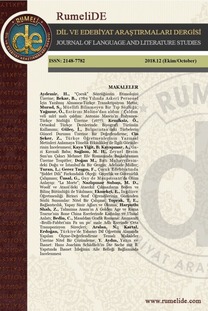Üstün bir sınıf yaratmak için öjenik bir girişim: Kazuo Ishiguro’nun Klara ile Güneş romanı
Technology, eugenics, gene modification, Kazuo Ishiguro, Klara and the Sun
A eugenic attempt to create “upper class”: Klara and the Sun by Kazuo Ishiguro
Technology, eugenics, gene modification, Kazuo Ishiguro, Klara and the Sun,
___
- Aultman, J.M. (2006). Eugenomics: Eugenics and Ethics in the 21st Century. Genomics, Society and Policy, 2(2), 28-49.
- Bavetra, S. & Ravi, R. (2021). Hope, Faith, Love, Human and Humanoid: A Study of Kazuo Ishiguro’s Klara and the Sun. Science, Technology and Development, 10 (5), 295-301.
- Dikötter, F. (1998). Race Culture: Recent Perspectives on the History of Eugenics. The American Historical Review, 103 (2), 467-478.
- Hui, L. & Ping, Y. (2021). Analysis of Klara and the Sun From the Perspective of Defamilarization. Higher Education of Social Science, 21 (2), 39-42.
- Ishiguro, K. (2021). Klara and the Sun. London: Faber&Faber.
- Jecker, N.S., Atiure, C. A.,&Ajei, M.O.(2022). The Moral Standing of Social Robots: Untapped Insights from Africa. Philosophy&Technology, 35(34), 1-22.
- Kevles, D.J. (2016). The History of Eugenics. Issues in Science and Technology. (Gene Editing Summit). 45-49.
- Mabrouk, D.M.M. (2022). Is the Digital Age Disrupting Our Emotional Feelings with Reference to Kazuo Ishiguro’s Novel Klara and the Sun. World Journal of Advanced Research and Reviews, 14 (01), 449-464.
- Mejia, S.& Nikolaidis, D. (2022). Through New Eyes: Artificial Intelligence, Technological Unemployment, and Transhumanism in Kazuo Ishiguro’s Klara nad the Sun. Journal of Business Ethics, (178), 303-306.
- Pernick, M.S. (1997). Eugenics and Public Health in American History. American Journal of Public Health, 87 (11), 1767-1772.
- Sun, Y. (2022). Post/Human Perfectibility and the Technological Other in Kazuo Ishiguro’s Klara and the Sun. Critique: Studies in Contemporary Fiction, Published Online: 29 Mar 2022, DOI: 10.1080/00111619.2022.2056429.
- Zhou, H.& Yang, Y. (2021). Death and Power: Biopolitics in Klara and the Sun. International Journal of Social Science and Education Research, 4(11), 333-339
- ISSN: 2148-7782
- Yayın Aralığı: 6
- Başlangıç: 2014
- Yayıncı: Yakup YILMAZ
Türk gençlik edebiyatındaki fantastik eserlerin değerler eğitimi bağlamında incelenmesi
18. yüzyıl şairlerinden Lem'î ve dîvânı
Eğretilemeler ve çeviri: Ekonomi dergisindeki eğretilemelerin karşılaştırmalı incelenmesi
Miraco: Piemontça ve şaşırma kategorisi
Uluslaşma, batılılaşma ve filoloji: Türkiye’de filolojik bilginin geçmişine bir bakış
Edebî eserlerdeki kahramanları rol-model alma ölçeğinin geliştirilmesi
One Flew over the Cuckoo’s Nest romanının Türkçede yan metinler yoluyla temsili ve dolaşımı
